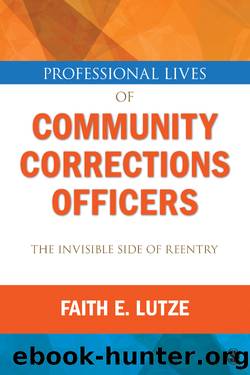Professional Lives of Community Corrections Officers: The Invisible Side of Reentry by Faith E. Lutze

Author:Faith E. Lutze [Lutze, Faith E.]
Language: eng
Format: epub
Tags: Social Science, Penology
ISBN: 9781452242262
Google: zXD5wAEACAAJ
Publisher: SAGE Publications
Published: 2013-11-07T05:18:39+00:00
Most CCOs were constantly aware of their surroundings and made a point to work with other officers, including law enforcement, when making an arrest or visiting an offenderâs home when they were uncertain about their safety (see Murphy & Lutze, 2009; Parsonage, 1990).
Many CCOs argue that carrying firearms is also a way to achieve increased levels of safety, whether real or perceived (also see Sigler, 1988; Sigler & McGraw, 1984; Sluder & Shearer, 1991). When asked if CCOs should carry firearms, most CCOs thought it should be an option and individual officers should determine what was best for them (Sluder & Shearer, 1991). Several officers cited safety as a key reason for being armed. For example,
Sure. Yeah, why not? You never know when something is going to happen. It might be a false sense of security, but I would [rather] have a false sense of security than no security at all. (CCO 110)
I think it enhances your safety today because thereâs a lot of people out there with weapons. Twenty years ago, it wasnât that big a deal. Ten years ago, it wasnât that big of a deal. But, last night, another killing in an apartment complex between two people. We probably have somebody on supervision in that apartment complex, and thereâs no reason for that shooting last night. So it enhances our safety and it enhances our opportunity for protecting ourselves more than anything else. And it enhances our opportunity to protect the public. (CCO 115)
Not all CCOs felt safer with officers being armed, as evidenced by the following CCO:
I think Iâm more at risk now because everybody knew that we were not carrying guns, and I think we were safer, criminals knowing that we donât carry guns. The other thing is that Iâd be afraid that some of my own peers would shoot me, because theyâre not police officers. They havenât had the training. I donât care what you say, they havenât had the training. (CCO 219)
Similarly, female CCOs in Ireland and Bergâs (2008) study overwhelmingly emphasized intuition, verbal skills, and communication to ensure safety and not guns, badges, or physical strength (male attributes). When asked if not for safety why carry guns, the female CCOs in Ireland and Bergâs (2008) study responded that it was now required, and carrying increased the respect from male parole agents. Women were comfortable with guns but just preferred not to carry them. It is uncertain whether this is true for male officers as well. A male officer in the Spokane study, however, did suggest that this may be true across gender.
I donât [think CCOs should carry guns]. I can think of about three occasions where I might have killed somebody if I had been carrying a firearm. And I was able to handle it, verbally diffuse it, and walk out of it without ANY of us getting hurt. Now Iâd like to think Iâd have enough judgment not to pull a pistol, but the reality is that unless weâre extremely well
Download
This site does not store any files on its server. We only index and link to content provided by other sites. Please contact the content providers to delete copyright contents if any and email us, we'll remove relevant links or contents immediately.
The 1921 Tulsa Race Massacre by Chris M. Messer(335)
Introduction to Criminal Justice - A Balanced Approach by Brian K. Payne Willard M. Oliver Nancy E. Marion(284)
Punishing the Poor The Neoliberal Government of Social Insecurity by Unknown(262)
Russia's Sakhalin Penal Colony, 1849â1917 by Andrew A. Gentes(258)
The History of Newgate Prison by Jowett Caroline;(247)
Serial Killers America and UK - 2 BOOKS IN 1 by Clark Matthew(233)
A History of Police and Masculinities, 1700-2010 by David G. Barrie Susan Broomhall(207)
Restorative Justice in Transitional Settings by Kerry Clamp(190)
Culture, Crime and Punishment by Ronald Kramer(178)
Cops, Cameras, and Crisis by Michael D. White Aili Malm(171)
Dangerousness, Risk and the Governance of Serious Sexual and Violent Offenders by Karen Harrison(169)
The Real CSI by Kate Bendelow(166)
Organized Crime and Corruption Across Borders by T. Wing Lo Dina Siegel Sharon I Kwok(166)
Routledge Handbook on Immigration and Crime by Holly Ventura Miller Anthony Peguero(163)
Policing Gender, Class And Family In Britain, 1800-1945 by Linda Mahood(161)
Women Exiting Prison by Bree Carlton Marie Segrave(160)
Using Murder by Philip Jenkins(156)
Losing Legitimacy by Gary Lafree(150)
A Theory of African American Offending by James D. Unnever Shaun L. Gabbidon(146)
